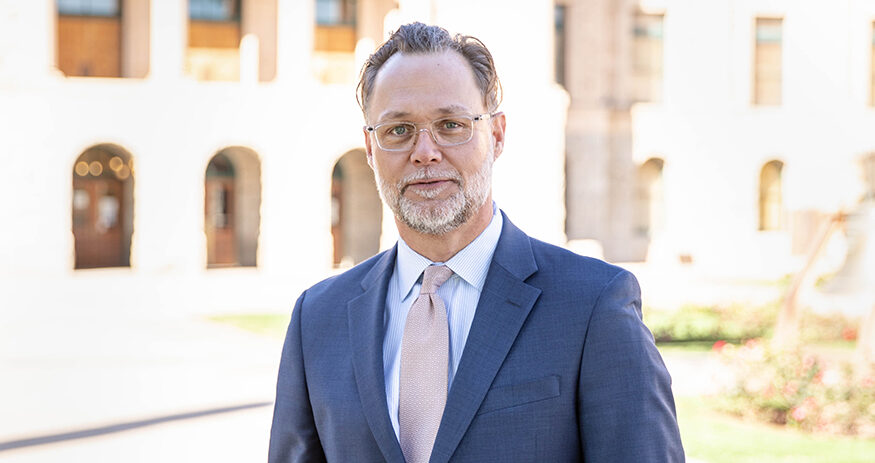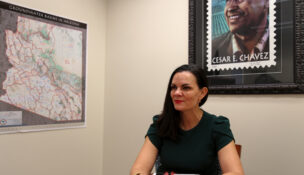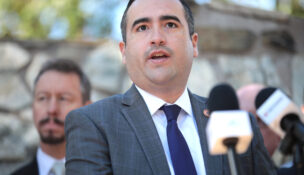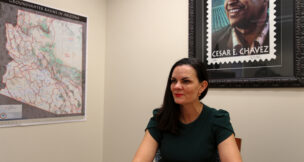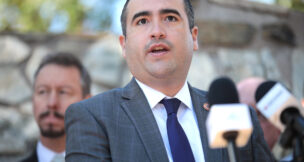Kurt Altman: Conservative in criminal defense, public policy
Kiera Riley Arizona Capitol Times//December 6, 2024//
Kurt Altman: Conservative in criminal defense, public policy
Kiera Riley Arizona Capitol Times//December 6, 2024//
Kurt Altman, owner and principal of Altman Law and Policy, is always hustling. On both the state and federal level, Altman has prosecuted, defended, lobbied and taken on whatever the moment calls for. In the past year, he represented an indicted Cochise County supervisor for failing to timely certify the election and is currently defending a Trump ally in a pending electors case, all while gearing up to push criminal justice reform in the next legislative session
Now, Altman takes the time to reflect on his passion for criminal justice and how his work across both the legal and lobbying worlds informs his approach.
What are the more challenging parts of working within both the courts and the Legislature?
Sometimes people don’t know what my identity really is. Over the years, I’ve represented lawmakers from a legal basis, not necessarily criminal, but they need a letter written, or they’re getting sued. I do some election stuff too, and then I’ll be down at the Capitol talking about, I don’t know, criminal justice policy or health care policy… I think it all stems from, one, I’m always hustling because I’m a small practice, and two, I’m always like, yeah I could do that. I could figure that out.
How does your work in the legal system assist in your lobbying efforts?
It gives me some credibility. Because if we’re talking about criminal justice … I’ve done it on both sides. All these people can tell you about the theory, let me tell you how it works.
What policy area most draws you in?
Criminal justice reform. When you hear criminal justice reform, most people don’t think of conservatives. I really think that it’s easy for policymakers and certainly the public to overlook the nuances of the criminal justice system. I don’t think anybody’s going to argue that violent and dangerous criminals shouldn’t be removed from society in some fashion, or (go) unpunished. But I really find I struggle more and I’m more frustrated by lower level things that actually have a significant effect on people’s lives.
Goodyear makes tires, and every year they go into research and development to try to make that tire better, safer, last longer, cheaper, and they never stop. And why can’t we do that with the criminal justice system, right? I think our budget’s what? $2.2 billion for corrections in Arizona. What’s the return we’re getting for $2.2 billion? 62% recidivism? Well, that’s not a great return, and just throwing money at it is obviously not working. So what else can we do?
What policy successes have been most monumental to your career?
When I first started in criminal justice in Arizona, and this is going to be controversial, but we chipped away at civil asset forfeiture laws. I was law enforcement. I know why law enforcement has civil asset forfeiture, but even when I was on that side, it never seemed very American to me that you could just take stuff.
In my practice, early on, I saw things, and thank goodness it doesn’t happen every day. I remember there was a Salt River reservation mom whose kid was driving her car with marijuana in it. Not that it’s a good thing, but like kids do. Law enforcement sees an opportunity to take that car. She’s calling me going, “It wasn’t my drugs, it was my kid. How do I get my car back?” … How much is your car worth? She’s like $5,000. Then you should try and save up $5,000 and buy a different car. It’s not worth it … It shouldn’t be like that.
In ’17, we made big reforms, changed the burden, with the ultimate goal being actual forfeiture not taking place unless there’s actual criminal conviction. It was a big deal. Law enforcement is still mad at me.
What policy changes remain to be seen?
I’ve taken a couple years off what I call the Arizona Judicial Discretion Act, which in certain cases, gives more discretion for judges. These judges are trained. These judges see this stuff. I think justice needs to be consistent, but also individualized, and a lot of mandatory sentences that everybody thinks sounds good, ties the judges’ hands.
I do think there should be some sort of, what we call a safety valve in the law where certain criteria on certain cases are met … A form of that has been in the federal system since 1994, and the sky has not fallen down.
We don’t have parole in Arizona, we’re one of only a couple states now that are still a truth in sentencing state, for the most part, where you serve 85% of your DOC time. … This guy gets 10 years. This guy gets 10 years. This guy goes in, gets a job, gets an education, makes himself better, preaches the church, he’s going to serve eight and a half years. This guy gets in trouble, never comes out of his cell, never betters himself. He’s going to serve eight and a half years. There’s no incentive without parole. So we should keep building some kind of earned release.
What has been your experience pitching criminal justice reform in the Arizona Legislature?
When I first started, I’d get a lot of funny looks. There’s a couple people that might still be in the Legislature. They’d be like, what kind of liberal stuff is this? Then I would have to convince them that my client was a conservative organization out of Texas.
It was tough to get in some doors sometimes. But then if I get in the door, somebody would listen to me. I’m the only guy, I think, in Arizona that has people on death row as a state prosecutor and a federal prosecutor.
It’s funny. Conservatives in general are supposedly limited government all this, but every time I do have an issue I say, “OK, you are, you’re limited government. But why do we just blankly throw money at corrections and criminal justice and police officers without getting a return on investment. When you put it in those terms, sometimes you get a “Huh, That’s a good point.”
What have been some major takeaways from your work?
It’s human. It affects everybody. … Policy and the law are so intertwined. And I say it all the time, man, just don’t forget, it’s a human business. The whole thing is a human business.
It’s hard to have an open mind, but understand, we are not enemies. You might think this is right. I might think this is right. We might both be right. We might both be wrong, but it’s worth the fight. Sometimes it gets frustrating. I’m like, What am I doing? But I think it’s worth it, absolutely.
How has your work in criminal justice shaped how you see your defense work of politicians and those in the political world, like Cochise County Supervisor Peggy Judd and Michael Roman?
In any other atmosphere, those cases would likely not have been brought. Certainly the Cochise County cases … I think the same goes for the elector case … I think in a less charged political atmosphere, we wouldn’t be talking about those cases. And I think prosecuting those cases takes a heck of a lot of resources away from cases that should be prosecuted.
It’s a bad precedent. Hopefully, you know that precedent will not lead to more retaliation type cases. … Now, that’s not to say that when crimes are committed, they should not be prosecuted, right? It’s a fine line. … Peggy Judd – it bankrupted her. She was not running for re-election, not going to be a supervisor. She cast a vote, essentially, that she was prosecuted for. And after a year, that pretty much bankrupted her. She walked away because she wanted it to be over with because her husband died during the process from cancer. He was sick when it started. She just wanted everything behind her and over. She walked away with a plea to a misdemeanor and a fine that’s akin to a jaywalking ticket. Is that what we want to devote our state resources to?
What might the average person not know about you? What do you do off the clock?
I practice, and it’s only been within the last year – but I’m 57 and I try to stay in shape, and I practice Brazilian Jiu Jitsu.
Altman points to a bruise on his face
This was from today. It’s physically and mentally, the hardest thing I’ve ever done. But for an hour or two, when there’s a lot of stuff going on in my head, a lot of legal stuff, a lot of cases, policy stuff going on, you can focus on nothing. Spiritual is probably a weird word for it, but it kind of is.
What goals do you have for the future?
Retirement. The one thing I’ve never done is run for office, but I don’t see that happening. Goals for the future … corny as this sounds … is just to keep making positive change.

